Posts Tagged ‘Memphis’
One Year Later: The Church Still Moves In Haiti
“One year later, the need in Haiti is great, but…churches continue to be agents of change in their communities, and men, women and children continue to receive support from their local churches.”
Shaken
Thirty-year-old Jeannette was away from home the day a 7.3 magnitude earthquake struck southern Haiti in August 2021.
“I was out and my three children were at home when the earthquake hit,” Jeannette said. “I felt as if the earth was opening up and wanted to swallow me. I begged God to save my children who had not yet gotten out of bed.”
When the shaking stopped, she returned home to discover that one side of her house had collapsed. Miraculously, though, her children survived!
The earthquake killed 2,248 people and injured 12,763, while 344 others are still missing. At the same time, 53,000 houses were destroyed leaving thousands of families homeless, and another 77,006 homes were damaged.
For women like Jeannette, earthquakes pose threats that extend beyond just the initial disaster alone. Ongoing instability in Haiti has left insufficient national infrastructure to conduct disaster responses, and the remote locations in which they live make it difficult for other NGOs to respond.
And yet, thanks in large part to relationships that were built in 2016, a network of local churches was there to respond.
United Through Disaster
In October 2016, Hurricane Matthew barrelled through southern Haiti, causing incalculable damage and devastation for the millions of Haitian citizens living in the area. Amidst the damage and destruction, World Relief invited 50 local church leaders, like Claire Audrique, into a collaborative relief effort.
“We were very siloed as churches. Never before did we pastors gather to eat or rejoice together. I feel our lack of unity did more harm than Hurricane Matthew ever could.” – Pastor Audrique
After several weeks of training with World Relief, the pastors and their congregations embraced a new position of strength and purpose and began working together, providing immediate assistance for 6,000 of the most affected families — removing debris, supplying food and repairing homes for those without shelter.
These 50 congregations would continue to work together, forming the Les Cayes Church Empowerment Zone (CEZ). Over the next five years, these churches would:
- restore the agricultural livelihoods of thousands of families in their community
- start a weekly soup kitchen for elderly widows
- build a cross-denominational ministry for couples and families
- make monthly visits to the local prison
- pool their resources on a monthly basis to fund food and hygiene kits for the sick in the local sanatorium
- start a professional school and launch ministries for women and children
The Church Responds Again
In Les Cayes, where insufficient national infrastructure had been lacking, the church had become the catalyst for rebuilding and renewal. And in 2021, they were there to rebuild and renew again.
In the two weeks following the 2021 earthquake, Pastor Audrigue and the Les Cayes Church Empowerment Zone mobilized 105 churches to respond — that’s more than double the amount of churches equipped to respond in 2016.
Together, they identified and served more than 4,400 families and individuals like Jeannette by providing hygiene, food and shelter supplies.
“After the earthquake, I was left with nothing but my children. We spent many nights sleeping outside in the yard,” Jeannette said. “The assistance from World Relief really helped us a lot. Thanks to this assistance we had provision for many days and we thank God for that.”
A Church for the Future
One year after the earthquake, Haiti still faces significant challenges including a political crisis following the assassination of their president on July 7, 2021. As a result, the security situation continues to deteriorate.
Nevertheless, the churches in our CEZs continue to serve their communities faithfully. In the Les Cayes CEZ, pastors tell stories of the support that people received immediately following the earthquake, and they dream of future support that will be given. Pastors and communities learned are now more committed than ever to working together and serving the most vulnerable in their communities.
Meanwhile, World Relief continues its earthquake response work, partnering with Habitat for Humanity Haiti to repair 102 homes that were partially damaged, and train local masons to build earthquake-resistant homes.
While 11 homes are currently being built, the lessons learned through the construction of these homes will serve the community for years to come.
World Relief Haiti and our local churches have played a part in this project by identifying the most vulnerable people in the community as recipients of these new and repaired homes.
One year later, the need in Haiti is great, but the lessons in collaboration and solidarity have only strengthened the community’s resolve. Churches continue to be agents of change in their communities, and men, women and children continue to receive support from their local churches.
When headlines fade, World Relief remains, strengthening communities in places like Haiti to better respond the next time disaster strikes. Learn more about our disaster response efforts and join us.
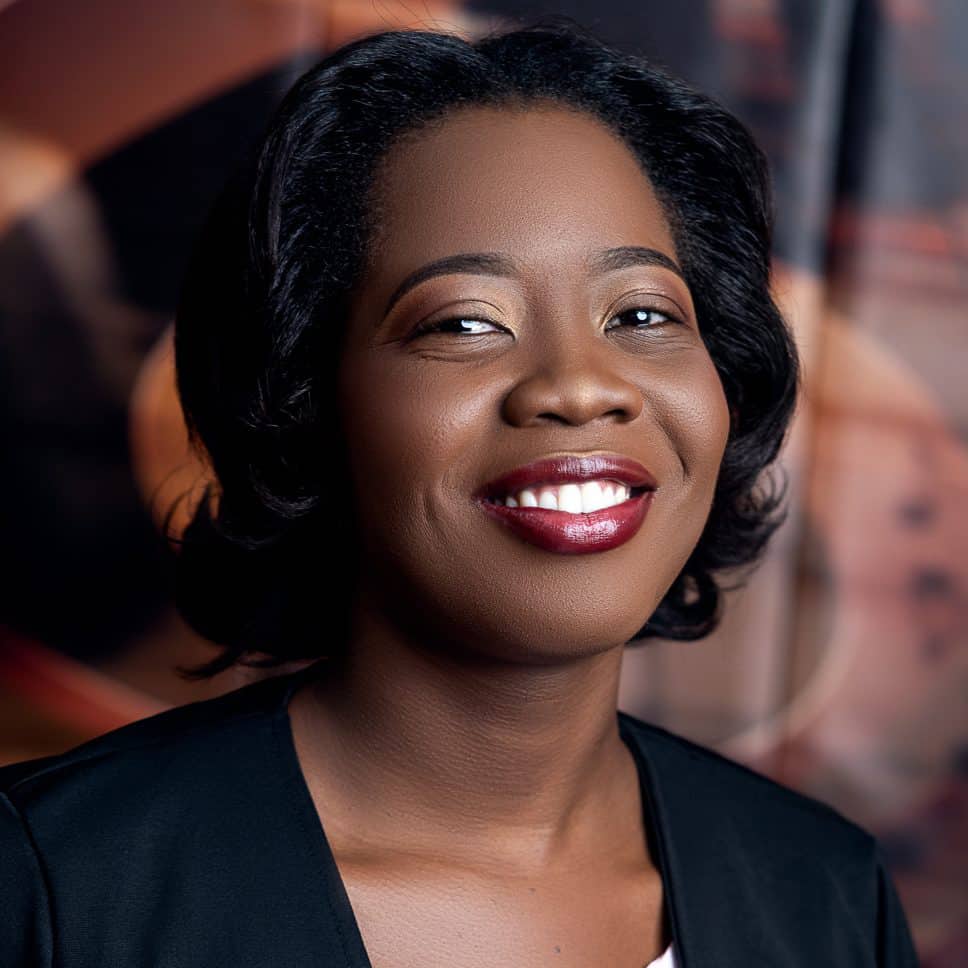
Esther Pyram Louissaint is the Director of Programs for World Relief Haiti. Esther has over 11 years of experience working in church and parachurch organizations. She started with World Relief Haiti as the CEZ Program Manager in 2016, and has developed deep and lasting relationships with many pastors and churches all across Haiti. She is passionate about life, the church, and the well-being of others. She is a servant leader who values excellence, discipline, respect, integrity, and humility in everything. Esther holds an MBA in Business Management and a Bachelor’s Degree in Social Communication.

Lydia Dawson serves as World Relief’s Humanitarian and Disaster Response Unit Program Officer in Sudan, and in disaster response worldwide. Prior to joining World Relief, Lydia worked in homeless services and community development in Oregon and California. She is passionate about equity and honor for underrepresented groups, both locally and internationally.
How to Sustain Your Compassion When Headlines Fade And Problems Persist
How can I be a part of creating change that lasts when I’m too exhausted to even turn on the news? How can I sustain my compassion when headlines fade but problems persist?
We live in an interconnected world. Sometimes, that thought can feel warm and fuzzy, conjuring up images of unity and togetherness. But today, it can also feel overwhelming.
Across the globe, we’re seeing how the world’s challenges are connected and complicated, and they can’t be solved overnight. Like in Kenya, where Turkana County is currently experiencing its fourth consecutive season of drought — a crisis made worse as the war in Ukraine has turned “agricultural fields turned into battlefields” and blocked the export of millions of tons of wheat and maize. As a result, food prices are rising and millions of people are at risk of malnutrition and starvation.
Even before Ukraine, the world was already bending under the weight of the coronavirus pandemic. Afghan refugees fleeing the Taliban continued to need resettlement. Men, women and children in South Sudan were experiencing historic flooding, and southern Haiti was still recovering from a devastating earthquake and political upheaval after the assassination of their president.
At World Relief, we know you want to be a part of creating change that lasts. Yet as one crisis compounds another, you’re likely asking yourself — How can I create change when I’m too exhausted to even turn on the news? How do I stay engaged and sustain my compassion when headlines fade but problems persist?
Dennis Mwangwela has been working at World Relief for more than 20 years. He currently serves as the Director of Integral Mission for International Programs. In the wake of Haiti’s earthquake last fall, we asked him how he continues to have hope and persevere in his work even when it feels like progress gets wiped away by conflict or natural disasters.
His words are a call and an encouragement to all of us as we lean in and look for ways to sustain our compassion when hardship persists and headlines fade.
“Biblical hope is different from being optimistic. Biblical hope is enduring even in the most difficult circumstances because it’s not based on what I see, but it’s based on God’s unchanging character and promises.” — Dennis Mwangwela
Hear more from Dennis in the interview below:
Road-Runner Rodney
What is one of the biggest challenges refugees face when they come to Memphis?
Transportation!
Access to reliable transportation is crucial for refugees as they are attending English classes, important appointments, and other vital services during their integration journey. The World Relief Road-Runners program exists to serve families and individuals through providing transportation and building friendships along the way!
Rodney has been a road runner for almost 4 years, and I recently had the opportunity to interview him about his experience working as a Road-Runner. Rodney first heard about World Relief when a staff member came to speak at his church, and he decided to attend a volunteer training to learn more about refugees and immigrants. Before volunteer training, Rodney was unsure how he wanted to get involved, but he went into the meeting praying: “God, I want to be open to you. I want to be the person that you want me to be. I want to experience everything you expect me to experience!” When he learned about the Road-Runner program, he felt like God was calling him to participate, so he signed up.
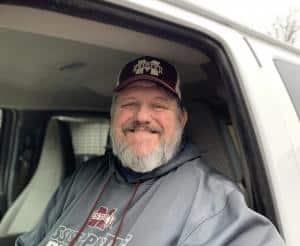
Rodney drives a 15-passenger van to pick up clients for their regular English classes with the Connect Language Center, and it hasn’t come without its set of challenges. Sometimes he drives students that do not speak any English. Rodney poses the question “How do you love somebody that you really can’t communicate with?” While language is definitely a huge barrier in relationships, he is not discouraged, “I pray every day that God’s love will be conveyed through the way that I greet them in the moment and the way that I talk to them.” Rodney says that he relies on very animated expressions and a translation app to get to know the people he drives.
At the end of each class cycle, Rodney takes the students he drives on a fun outing to celebrate their time together. They have done everything from eating a meal at Rodney and his wife’s home, going out for pizza, or even riding go-karts together! “The Bible says: ‘they’ll know we’re Christians by our love,’ and I’ve tried to love the ears off every last one of them that comes through here. To be a friend, to laugh with them, to make them feel comfortable around here.”
I’ve tried to love the ears off every last one of them that comes through here. To be a friend, to laugh with them, to make them feel comfortable around here.
When asked to reflect on his time as a Road-Runner, Rodney said “This one most worthwhile things that I’ve ever done in my life…It’s been good for me because it helps me to understand more the people I see in the world: the homeless person, the person on the corner asking for money and stuff like that. I can at least pray for every person that I see like that, and ask God to work in their life, and to draw them to Himself. Because if all is said and done and today is the last day, have I done everything that I could? Be the person that God wants me to be and say the things that He wants me to say, and love the people that He wants me to love?”
World Relief Memphis is so thankful for Rodney, his faithful service to our clients, and for his clear love of God!
If you have been wondering what you can do to help refugees and immigrants, we are in urgent need of 10 more Road-Runners for the current ESL class cycle. Please consider providing a much-needed service for clients as they integrate here in the Memphis area. Along the way, you will develop relationships that transform lives for all involved!
For more information and next steps, reach out to our Volunteer Coordinator, Lydia Milton
LMilton@wr.org
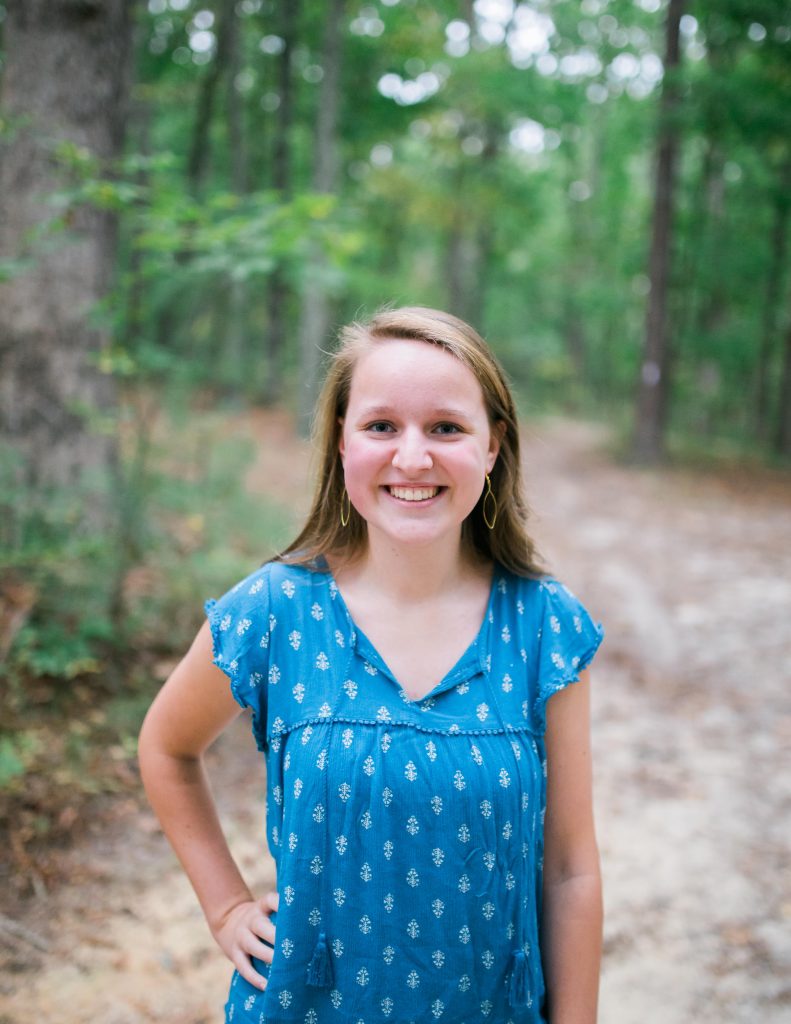
Author: Grace Elder
Mobilization Intern at World Relief Memphis & rising Senior at Covenant College
Attend one of our monthly volunteer orientations to find out next steps for Road-Runners or one of our other volunteer opportunities:
Feeling called to make an impact but can’t donate your time? Learn more about joining our monthly giving program The Path.
June Reflections from World Relief Memphis Staff
This past month was a busy one for World Relief offices around the globe as we all celebrated Immigrant Heritage Month, World Refugee Awareness Month, World Refugee Day, and Juneteenth. Here at World Relief Memphis our theme for the month of June was “Learning Never Stops.” Yes, summer is a time away from school, and for many, a time of rest and vacations, but we feel that learning and growing is something that we can and should be doing all year long.
To live out our theme, we made our monthly staff meeting a time of learning and reflection from our fellow coworkers. Several of our staff members shared with their peers their experience and thoughts on what Immigrant Heritage Month, World Refugee Awareness Month, World Refugee Day, and Juneteenth means to them and how they have impacted their lives.
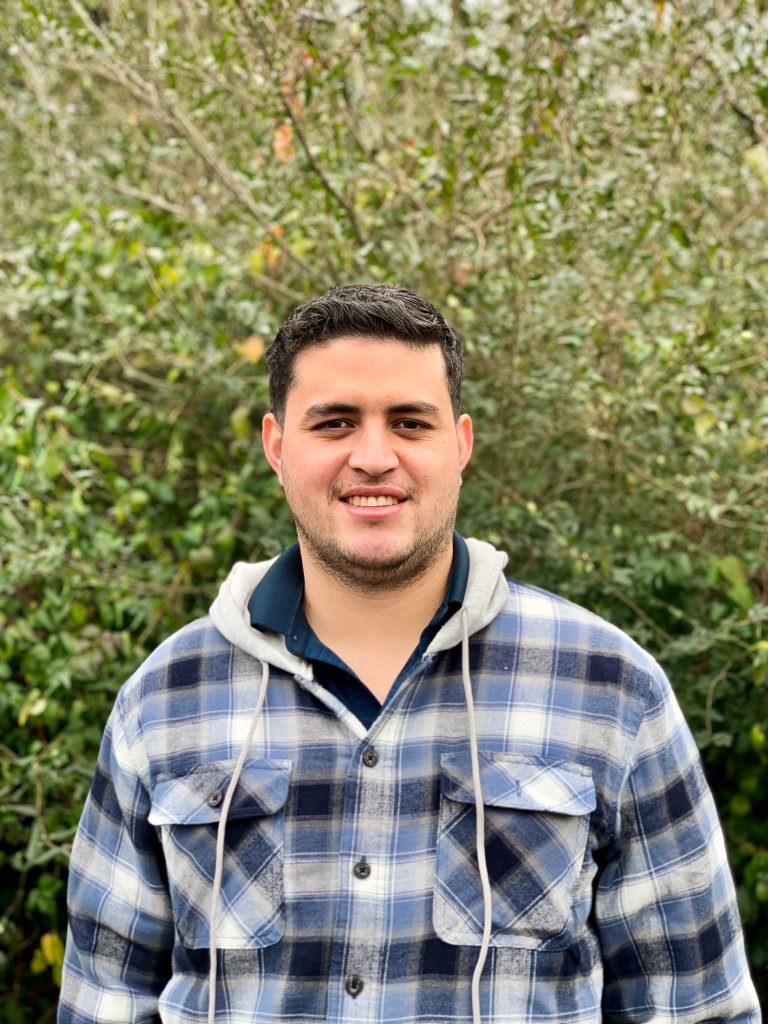
Oscar Cruz, Employment Specialist, told the office his experience as an immigrant from Honduras and what thoughts Immigrant Heritage Month brings up for him. For Oscar, this month makes him think of his parents and what they have taught him. “My parents always taught me to respect the traditions of each individual.” Living in the U.S., it is not hard to find people who have differing traditions than you. That is one of the beautiful things about America, you can always learn something new and be exposed to traditions from all over the world. “As a Honduran, our most popular traditions are grilling out with friends, soups on Sundays, and baleadas”. Being able to continue his traditions and learn new ones is a way he shows, “the importance of loving our neighbors.”
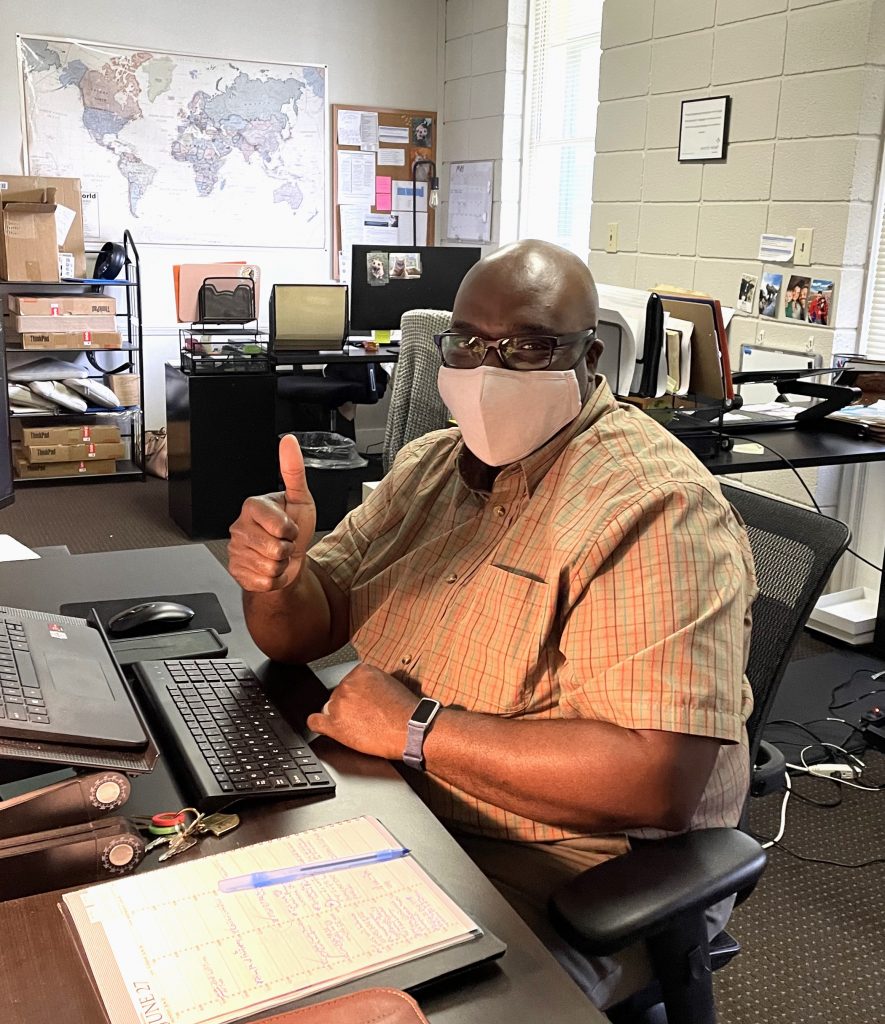
Clarence Williams, also an Employment Specialist, shared what Juneteenth has meant to him over the years. He explained that his “family celebrated July 4th as Juneteenth for many years.” He remembers his mother telling him that, “July 4th is great for fireworks but we were not free.” From a young age, his parents used Juneteenth as a time for celebration but also a place to impart life lessons to their children. Clarence recalls three main points his parents taught him that he has now passed on to his children:
- Believe what people show you in their actions. You cannot change how people treat you. It is not your job is not to try to convince them of anything.
- Be in control of your actions. God will freely forgive you of your wrong doings, but sometimes consequences will remain.
- Give and don’t lend to others. If you can’t give without looking for a return, then keep it in your pocket.
Clarence recalls that his father was only able to obtain a sixth-grade education. Yet, he taught him that freedom and responsibility always go together.

Lydia Milton, Volunteer Coordinator, also shared her thoughts on Juneteenth. “Juneteenth is a time for us to celebrate our freedom as African Americans. Although there’s still a lot of work we are working towards, we can stop and celebrate how far we’ve come.” There is a lot of history in the Black community that has not been widely known or celebrated amongst all peoples in the U.S. What Lydia shared is a great piece of advice to sit with. While not all is perfect, pieces are continued to be moved in the right direction.
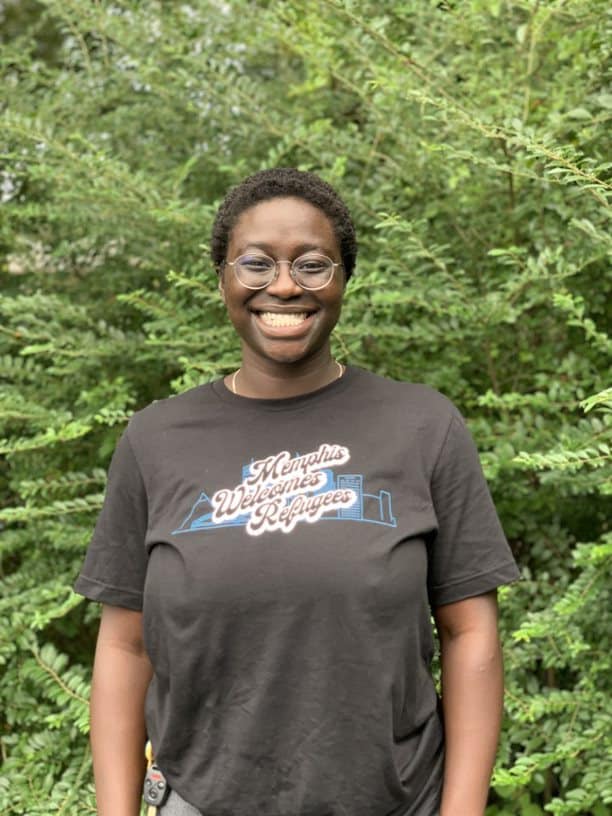
Mahasin Tutu and Basuze Madogo both shared their experience as refugees and immigrants in the states and what World Refugee Day means to them. Mahasin, Holistic Support Specialist, came to the U.S. as a child with her family from Sudan. She describes growing up in the States with a Sudanese family is like getting to live in two worlds. She said, “it can be a beautiful thing, but its hard when the cultures clash.” Even though it can be hard at times to navigate, she loves her family, “and the people who have become family.”
Basuze came to the U.S. later in life and has made the full circle journey from becoming a refugee, resettling in Memphis, to now working as a Resettlement Specialist. He shared the importance of World Refugee Day becoming official on a personal and global scale. It shows that the struggle and the celebration of refugees is being acknowledged and given a voice. Basuze brought to attention the UNHCR’s theme for World Refugee Day this year, “Whoever. Wherever. Whenever. Everyone has the Right to Seek Safety.” He felt that this theme spoke to the discrimination that is seen even amongst the refugee community. Though all those who are refugees are fleeing from similar circumstances, it has become clear that the rhetoric and actions taken by many regarding recent more Eurocentric refugees fleeing have been vastly different compared to refugees from other areas. The UNHCR theme helps share the truth of all who are seeking safety are important, valued, and loved.
After hearing these meaningful messages from our staff, we see the importance and the value of continued learning in our office and in the world as a whole. Taking the time to talk to our neighbors and learn their stories is a small but significant step forward in developing understanding, empathy, and deeper relationships between the community around us.
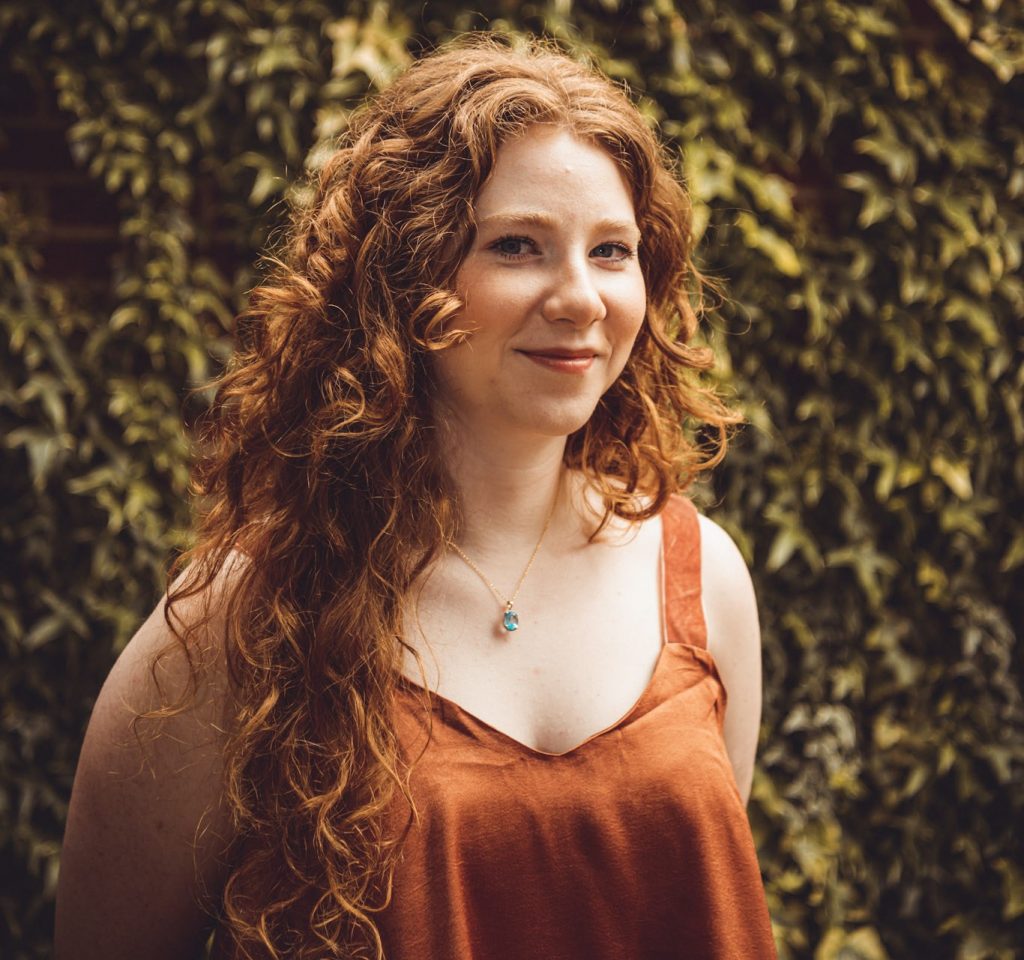
Author: Kara Spencer
Communication Coordinator at World Relief Memphis, recent graduate of Harding University, and Memphis native.
We hope you were able to continue your learning this month and grow your understanding and appreciation for the Memphis community.
If you would like to learn more about World Relief Memphis in the coming months, follow us on social media and sign up for our newsletter to stay up to date on events and volunteer opportunities.
If you are interested in volunteering join us for one of our monthly volunteer orientations:
If you are searching for an opportunity to begin making a bigger impact, join our new monthly giving program, The Path, for exclusive updates, virtual events, prayer chains, and stories of hope from the women, men, and children whose lives you change.
Angels Unawares
“Be not forgetful to entertain strangers: for thereby some have entertained angels unawares.”
-Hebrews 13:2
There are few things more mysterious, frightening, and wonderful than an encounter with the divine. I wonder from time to time how I might respond. I wonder what I might learn about God and the world around me—about myself. I believe this is something we were created to both think about and, in certain ways, to experience.
The last year has been one of great transition and lifestyle change for my wife, Morgan, and me. Last Summer, we moved back to our hometown of Memphis, TN and I began my role with volunteer engagement at the local World Relief office. Between our transition and the impact of world events like the Afghanistan crisis on my work, we decided this was the year to book the trip to Italy we have wanted to take for some time now. I was very much looking forward to new experiences and to recharging by unplugging briefly from refugee resettlement matters which had consumed so much of my focus in the past year.
During our tour of Rome, we visited the Vatican City where we saw some of the most amazing religious artifacts and structures imaginable. But it was the piece we saw as we exited through St. Peter’s Square which provided the most spiritually intense experience of the day. Morgan caught a glimpse of a large, dark statue in the corner of the square which we proceeded to investigate. The structure resembled a small vessel, like an escape boat, crowded with people of all forms and origins. The name of the work was “Angels Unawares” and you can read more about it here. I won’t exhaust you with description but I will note that, as alluded to by the title, there is a lone pair of angel’s wings protruding from the crowd.
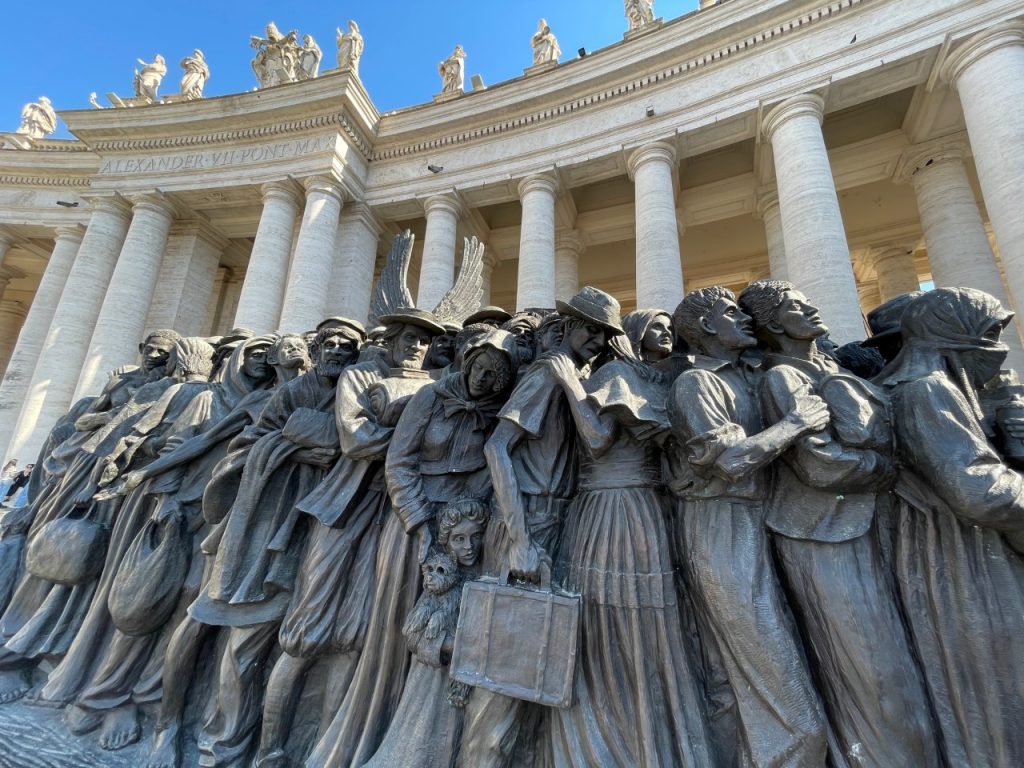
The sculptor, Timothy Schmaltz, describes his works as “visual prayers” and, whatever that means, I certainly felt it as I stared and pondered. I saw the faces depicted of immigrants and refugees from different centuries, cultures, and continents. Each face told a story—hope, fear, loss, dreams. In the center, the two wings, a reminder that where these people go, a divine presence is surely with them. This symbolizes what is written in Hebrews 13:2 that when we welcome strangers, we may in fact be welcoming angels.
For a long time, I was so puzzled by that passage. To some degree, it certainly is still mysterious. But when we look at the bigger message of God’s Word, I think we see a theme that helps us make sense of this biblical detail. Why would God have us entertain angels? Are these actual heavenly creatures being referred to? Why would they disguise themselves among strangers and foreigners?
To me, the heart of the answer lies with the person of Jesus himself. When God became a man, he took on the lowliest status (Phil. 2:6-8). In doing so, he taught us that those who are lowly possess indispensable value. Why come to us in a form we might perceive as less valuable if not to change our perception of a person’s value?
Our Christ was carried to a foreign land by his parents for fear of death (Matt. 2:13-23). This detail of Jesus’ life not only fulfilled an important prophecy but also proves to us that those who leave one country for another carry with them stories worth understanding. Why write this unique story into the life of our Savior if not to challenge us to understand the stories of those who sojourn among us?
Hebrews 13:2 suggests to us that our care for the foreigner is an encounter with the divine. If this seems like a radical insinuation, consider that Jesus took this idea even further when he described the final judgement in Matthew 25:35-40:
“For I was hungry and you gave me food, I was thirsty and you gave me drink, I was a stranger and you welcomed me, I was naked and you clothed me, I was sick and you visited me, I was in prison and you came to me.’ Then the righteous will answer him, saying, ‘Lord, when did we see you hungry and feed you, or thirsty and give you drink? And when did we see you a stranger and welcome you, or naked and clothe you? And when did we see you sick or in prison and visit you?’ And the King will answer them, ‘Truly, I say to you, as you did it to one of the least of these my brothers, you did it to me.’”
There is no question that Jesus has closely and permanently linked our pursuit of a holy life with care for the alien in our midst. There is something about compassion toward the vulnerable so integral to the heart of God that he placed them squarely on our narrow path to eternity with no way around them. Surely, if we want to encounter Christ himself, we must do so with the immigrant and the foreigner at our table. These promises also confirm to us that—when we inevitably experience vulnerabilities for ourselves—Jesus sees us, is near to us, and his love is directed to us.
I walked away from St. Peter’s Square that day challenged in regard to my daily life. But I also walked away hopeful because I was reminded that God has given me a very clear blueprint for how to receive and give his love in a practical way. When I welcome a stranger and love them as a neighbor, I am certainly welcoming Jesus himself into my rhythm of community. I might also be welcoming his angels—and what a blessing that would be.
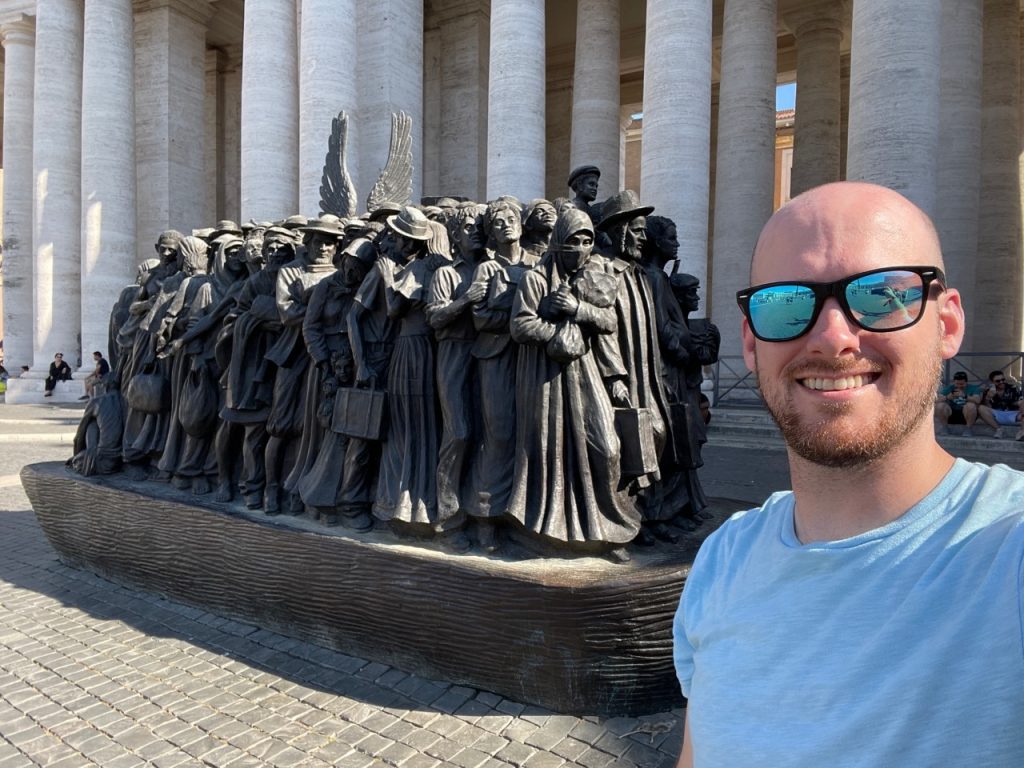
Author: Carter Brinkley
Volunteer Coordinator at World Relief Memphis
If you are interested in learning more about what we do here at World Relief Memphis, join us for one of our monthly volunteer orientations:
Feeling called to make an impact but can’t donate your time? Learn more about joining our monthly giving program The Path.
Introducing Co-Sponsorship
Here at World Relief Memphis, we believe that entering into relationships with refugees and immigrants are mutually transforming opportunities to bring lasting change to our world. One of the ways we are seeking to foster these relationships is through our new volunteer opportunity: Co-Sponsorship teams. Teams are made up of a group of volunteers who will intentionally walk with a newly arrived refugee family as they navigate their new lives here in Memphis. We recently had the opportunity to speak with Sam about his experience with a Co-Sponsorship team.
Sam and his family are originally from Afghanistan, but they lived for a few years in another country of asylum. When his family moved to the United States in April, they were given the option to choose to work with a Co-Sponsorship team, and after consulting with World Relief staff, they chose to work with the team of volunteers.
Sam recalled his first introduction to his Co-Sponsorship team when they met his family at the airport at 12am and did not leave until 4am. They made sure he and his family were settled into their home and had everything they needed. Since their first meeting, their Co-Sponsorship team has assisted the family with various things such as acquiring their state IDs, other paperwork, packing their belongings and moving from temporary housing into a permanent house, and providing consistent and reliable transportation to various doctors visits and other appointments for the whole family.
Now after a few months, their relationship has grown into a flourishing friendship, much more than just accomplishing tasks. When asked about his Co-Sponsorship team, Sam says, “We feel them like our own family…We are grateful for the country. For the American people.” They have been able to explore the Memphis area by doing things like going to Shelby farms and other fun outings thanks solely to their new family, the team.
Sam says that he is thankful for the ways that the Co-Sponsorship team has been available to come alongside his family. “Every time we need them, they showed up, and they helped us,” Sam recounted. “So, if any other family from Afghanistan or from other countries, I would suggest them to choose a co-sponsorship team.”
As we are welcoming more and more new refugees into the United States, World Relief Memphis has a growing need for a variety of volunteers including Co-Sponsorship teams.
If you are interested in learning more, reach out to Laura for more information about being a part of a Co-Sponsorship team!

Author: Grace Elder
Mobilization Intern at World Relief Memphis & rising Senior at Covenant College
Attend one of our monthly volunteer orientations to find out next steps for Co-Sponsorship or one of our other volunteer opportunities:
Feeling called to make an impact but can’t donate your time? Learn more about joining our monthly giving program The Path.
Welcome to Reciprocal Hospitality
Many American Christians have good intentions, working hard to welcome immigrants with hospitality and solidarity. But how can we do that in a way that puts our immigrant neighbors first rather than pushing them to the fringes of white dominant culture and keeping them as outsiders? That’s exactly the question Karen González explores in Beyond Welcome: Centering Immigrants in Our Christian Response to Immigration, a new book coming out this fall.
Today, we’re excited to share an excerpt adapted from Beyond Welcome and hope you feel challenged to move beyond welcome as you get to know new immigrants in your community.
In many Latin American countries, hospitality is expressed in the familiar proverb “Mi casa es su casa.” It is notable that the saying includes the pronoun “su,” which stands for the formal “usted” used when talking to strangers or older people.
The phrase means “My home is your home, stranger.” How does that phrase reimagine the way we think about hospitality to strangers and immigrants? How does it move us beyond the host and guest dichotomy and into a hospitality that moves in both directions, a reciprocal hospitality?
I remember being awed when I learned that in his lifetime Jesus received and accepted hospitality and financial support from many people found on the margins of the first-century Near East: women, sex workers, tax collectors who were known for cheating people, and other sinners.
What is perhaps less known is that he also reciprocated this hospitality—though he was a man without a home as he himself says, “Foxes have holes, and birds of the air have nests; but the Son of Man has nowhere to lay his head” (Luke 9:58), he not only shared meals with people but also saw them, listened to them, accepted them and identified fully with them. He embraced them with a hospitable generosity of heart — listening, learning and engaging over and over again in his encounters with those in and outside his immediate circle:
- the Samaritan woman at the well in John 4
- his disciples on the road to Emmaus in Luke 24
- in conversation with the Syrophoenician woman in Mark 7
This reciprocity is exactly what is often missing in modern rhetoric around hospitality to refugees and other immigrants—that hospitality only moves in one direction: from the native citizen with rights to the immigrant in need. I am not referring to the kind of hospitality where an immigrant person is invited to a citizen’s home for dinner, though that is one kind of hospitality.
What I am referring to is the kind of hospitality that is truly engaged, where native citizens listen to and learn at the feet of immigrants they have welcomed to their countries—the kind where immigrants are asked to give feedback and evaluate services we receive, including resettlement; the kind where immigrants are at the table and asked to speak into the planning of programs and services that serve our own communities; the kind where our dignity and choices are respected and decisions are not made on our behalf.
When hospitality is not reciprocal, those belonging to the dominant culture unconsciously begin to think of immigrants as having less in every way. The truth is that immigrants may need material possessions, language classes and other services, but as image bearers of God, we have gifts, talents and skills, not just needs.
It is important to revive the biblical practice of reciprocal hospitality in order to counteract these toxic narratives.
In her book Making Room: Recovering Hospitality as a Christian Tradition, Professor Christine D. Pohl writes, “There is a kind of hospitality that keeps people needy strangers, while fostering an illusion of relationship and connection. It both disempowers and domesticates guests while it reinforces the hosts’ power, control and sense of generosity. It is profoundly destructive to the people it welcomes.”
Without reciprocal hospitality, we unwittingly reinforce the status quo and unequal power dynamics—this action mars the image of God in our immigrant neighbors and widens the distance between us. Hosts have something to offer to immigrants, but immigrants have nothing to offer to hosts. When hospitality is reciprocal, it encourages the hosts’ humility and diminishes the impact of the disparate power dynamics in the room.
In John 14, as Jesus prepares for his death and for leaving his disciples, he says to them, “Do not let your hearts be troubled. Believe in God, believe also in me. In my Father’s house there are many dwelling places. If it were not so, would I have told you that I go to prepare a place for you? And if I go and prepare a place for you, I will come again and will take you to myself, so that where I am, there you may be also.”
The one who has been received, fed, and cared for in many homes will now return to his home to prepare a place for them in his own Father’s house—a reciprocal hospitality. They wouldn’t be just guests in the house but family, welcomed in “Mi casa es su casa” style!
You can pre-order Beyond Welcome: Centering Immigrants in Our Christian Response to Immigration here!

Karen Gonzalez serves as the Director of Human Services at World Relief. Shes is is the author of The God Who Sees: Immigrants, the Bible and the Journey to Belong, and Beyond Welcome: Centering Immigrants in Our Christian Response to Immigration.
Family Amidst Tragedy
How one Good Neighbor Team is providing hospitality and hope.
It’s been eight months since the fall of Kabul. World Relief North Texas welcomed many Afghans with the help of volunteer Good Neighbor Teams. Read about their mutual transformation as they recount their shared stories with us.
Susan has been attending Arlington Chinese Church for 6 years now. She is a part of a young professional’s community group there, where she has been able to develop an amazing community and grow in her relationship with Christ. Her parents were immigrants to the U.S. when she was just 3 years old. After moving from China to Texas, Susan worked hard alongside her parents to integrate to life in the U.S. During Susan’s 4 years of medical school in Fort Worth, she lived in nearby apartments where many refugees had been resettled by World Relief.
Her next introduction to the needs of new families was through her clinic, where many of them came in for their very first appointment with a doctor in the U.S. Through a desire to serve the most vulnerable and to understand her patients better, she explored volunteer opportunities with World Relief. She encouraged members of her small group to get involved by volunteering for a one-day event at a soccer game.
From this one event, her small group realized a need and wanted to know how to become more involved. As they prayed, they decided to serve as a Good Neighbor Team, a group of 8-12 people who commit to serve and walk with an arriving refugee family for the first 6 months in the U.S. As they prepared to become a Good Neighbor Team, the Afghan crisis happened and Kabul fell to the Taliban. Susan recalled that “the Lord timed it really well and we were able to take an Afghan family right as they came to the US.”
Asadullah and Sahar
Asadullah and Sahar lived a normal life in Afghanistan. Asadullah worked for the U.S. Government as a translator, and Sahar taught at an elementary school until she had two kids of her own who are now 2 and 4 years old, with a third child on the way. Asadullah mentioned that in the midst of this normal life, there were still hints of violence and danger throughout Afghanistan. Things such as target killings of those who were helping the U.S. or international organizations. Tragically, this included the assassination of Sahar’s father.
The Taliban’s invasion of their home displaced Asadullah and Sahar, along with over 700,000 other Afghan peoples who were evacuated from Kabul. Asadullah remembers receiving an email from his company that the Taliban had invaded and he needed to leave immediately. He rushed to get his wife and two children where they walked and waited in the Kabul airport all night long.
From here, they went on a long journey to arrive at a camp in El Paso, where they remained for two months. Then they were sent to Fort Worth, Texas where they were resettled by World Relief.
North Texas
When they arrived in Fort Worth, Asadullah says that they were excited because “we had a home and a kitchen, and World Relief continually helped us.” Susan recalled that they first met them in their AirBnB because their apartment was not ready yet. One of the first things that was said by Asadullah was “we are so happy to meet people that look like us.” (They are ethnically Hazara which descends from Mongolians and they will look more East Asian and less Arab or Persian.) Asadullah and Sahar shared with their Good Neighbor Team, “it is not just a coincidence that we were paired with you.” Susan shares that they are so sweet, the family was eager to get involved, settle down, and get their kids enrolled in school. It was a thrilling experience for the Good Neighbor Team to help them enroll their children in school and help them become integrated into society.
What impacted Asadullah and Sahar most upon their arrival in Fort Worth, was their Good Neighbor Team. Their Good Neighbor Team were the first people to meet them, help them move into their apartment, and take them grocery shopping. Asadullah and Sahar did not have any form of transportation or any knowledge of the metroplex, and are thankful that they had a Good Neighbor Team to show them these things. Their new friends took them grocery shopping, bought clothes for their children, and took them to picnics at the park.
After several months of spending time with his Good Neighbor Team, Asadullah reflected: “One time I invited the Good Neighbor Team over. We were all sitting around the kitchen table and I thought, ‘this is my family.’”
The impact surpassed any barrier of culture. Asadullah mentioned, “any time I faced a problem or didn’t know what to do, they were who I called. Without them, I’m sure I would have faced many problems.”
Family Amidst Tragedy
Sahar tragically had a miscarriage shortly after arriving to North Texas. Sahar mentioned how scary it was losing a child in a new place with no family. When she miscarried, they immediately turned to their Good Neighbor Team for help to navigate such a tragic situation. Susan was able to get Sahar to the hospital, and helped them navigate surgery, recovery, and medical bills. She still experiences deep sorrow over this loss, but the Lord used this circumstance to show Asadullah and Sahar that they are never alone, even during the most tragic times.
“Our Good Neighbor Team behaved like a family and encouraged us to not be disappointed about uprooting our lives.”
The Impact
As a huge impact was being made on the lives of Asadullah and Sahar, another impact was being made in the hearts of their Good Neighbor Team.
Susan mentions being impacted by the hospitality that Asadullah and Sahar showed them. She recalls being at their apartment with the whole team when they hardly had any furniture, and Sahar served them all tea and food, and gave whatever she did have to host them. Susan was deeply marked by being served by someone who hardly had anything.
We asked Susan what made the biggest impact on her in getting to serve Asadullah and Sahar, and she shared with us through tears, “seeing them has helped me to understand my parents’ journey to the U.S. as immigrants with nothing but a few hundred dollars.” Watching Asadullah and Sahar learning how to adjust their entire lives, and wanting to provide in the best way for their children has helped her understand what her own parents went through. “I never understood the sacrifices my parents had to make for certain things until I saw Asadullah and Sahar’s journey.”
Another amazing part of Susan’s parents’ story she shared was “my parents had an older couple who welcomed them from the airport and cared for them for the first 1-2 years of them being in the U.S. They helped my parents adjust and adapt because my parents spoke no English at first.” Susan, as well as the rest of the Good Neighbor Team, was able to love this family even more because they found unique ways they related to Asadullah and Sahar. “It’s been very rewarding to see how God uses each person on our Team because we all have different backgrounds and skill sets. God has allowed each of us to come alongside the family in different ways which is so sweet to see that this is how the body of Christ is.” Ultimately, she shared, “the impact on me has been the kindness shown in hospitality, the ability to relate from my own journey, and to see how the body of Christ can function using their different gifts.”
“They are very open about what they believe in, but also are very open to hearing about our faith, and I don’t believe any of those conversations could happen if it was not for the amount of time spent building a relationship.”
A New Home
Asadullah and Sahar say that they are happy they are here and that they are safe. They are thrilled that their daughters will have a great education and have an opportunity for a good life. Sahar said that she will never forget the first time she saw her good neighbor team because “I was so happy” she said as she beamed with joy even telling me about it. “It was very special. We felt like a family because our faces are the same as their faces. They are my family.” Right now, they are excited to attend Susan’s wedding. It will be their first American Wedding.
“The goal from the beginning was for them to see Jesus by becoming their friend.”
They have now been in the U.S. for 8 months, and in those 8 months, the Lord has provided them and their Good Neighbor Team with family, community, and the love of Christ.
If you have been inspired to serve with World Relief as part of a Good Neighbor Team, there are next steps for you!
Learn how you can become part of a Good Neighbor Team with World Relief Memphis HERE.
Your Family is Coming: The Long Road to Reunion for Refugees
Everyday, people like Ibrahim make the painful decision to leave their homes due to persecution, conflict, violence, human rights violations and climate-related factors. Their journeys are often marked by loss, separation and worry for those left behind.
For ten years, Ibrahim carried the weight of being separated from his family. This is his story of enduring hope.
An Impossible Decision
Ibrahim was born and raised in the Darfur region of western Sudan. He worked various jobs — housekeeping, construction, office administration — to provide for his family. He was married with three children and a fourth on the way.
While Ibrahim loved his home and community, the civil conflict left him feeling uneasy and concerned for his family’s safety.
For decades, Darfur has been embroiled in a conflict fueled by ethnic disputes and limited resources. In 2003, a rebel group launched an insurrection in Darfur, protesting what they believed was the Sudanese government’s disregard for non-Arab ethnic groups in the region. In response, the government armed ethnically Arab militias to combat rebels in Darfur.
Despite international attempts at peacebuilding and intervention, the conflict worsened. Militias threatened the lives and livelihoods of non-Arab civilians, burned down thousands of villages, committed sexual violence and blocked aid organizations from delivering much-needed food and medical supplies.
In 2013, as a renewed wave of violence gripped the region, Ibrahim made the heart-wrenching decision to flee Sudan, leaving behind his wife and children, hoping to find help.
“There was too much killing, too much fighting,” he said. “It was impossible to live.”
Seeking Safety
Ibrahim arrived in Jordan, where he had heard help was available. He registered with the U.N. High Commissioner for Refugees (UNHCR), meticulously completing his paperwork.
“I always wrote my kids’ names as my family on all the papers — all the dates of birth and everything,” Ibrahim said. He wanted to make sure records of his wife and children, still in Sudan, were included in his case so that they too would be resettled in a new country with him.
Ibrahim found work, sent money home to his family and waited.
Two years went by until one day, Ibrahim learned that his case had been approved for resettlement in the U.S. He passed all required security and health screenings, but because his family was still in Sudan, they could not travel with him.
With help from the International Organization for Migration (IOM), Ibrahim flew to the U.S. in 2016, where World Relief Triad welcomed him to North Carolina.
Ibrahim remembers feeling like he had escaped death.
“When I arrived, I was so grateful for World Relief because they helped me with everything,” Ibrahim said. “They helped me with a place to stay. They were able to find work for me, and they helped until I felt that I could do things for myself.”
And yet, as Ibrahim rebuilt his life in the U.S., he never stopped thinking of his wife and children, still stuck in Sudan. They frequently spoke over the phone — and Ibrahim continued to hope.
“I couldn’t really rest or enjoy all the blessings I had because I kept on thinking about them all the time,” Ibrahim said. “I never felt complete.”
Hoping and Waiting
Now in the U.S., Ibrahim continued working with IOM in the hopes of bringing his family to North Carolina. He was persistent, calling for updates whenever he could.
With IOM’s help, he was eventually able to secure interviews for his wife at the U.S. embassy in Khartoum, the capital of Sudan. Still, the process crept forward slowly.
Then, in 2019, just when everything finally looked ready to move forward, Ibrahim encountered another obstacle — the president of the United States announced a new executive order banning Sudanese people from traveling to the U.S., Ibrahim’s family included.
Ibrahim remembers being told, “Everything is correct; all the papers are the way they’re supposed to be. There are just some rules that they’re not allowing people.”
He began to doubt whether he would ever see his wife and children again. “I almost lost hope,” he said.
But then, in 2021, he got a call. A new U.S. presidential administration had reversed the executive order. Over the phone, he heard the long-hoped-for words: “Your family is coming.”
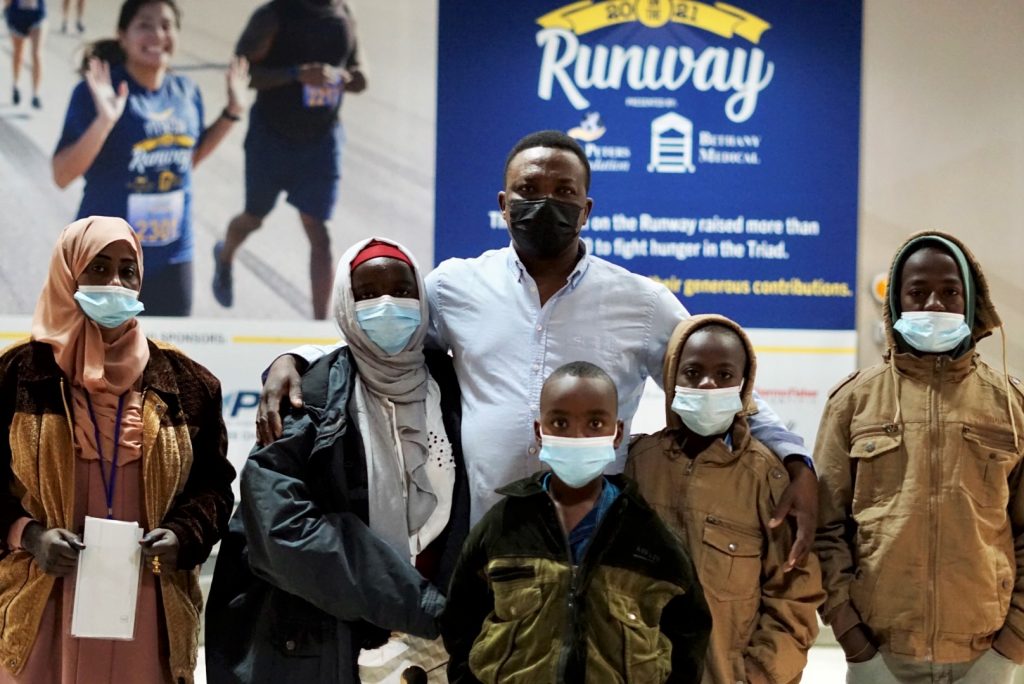
Ten years after Ibrahim had to leave his family behind in search of safety, after years of hoping and waiting, they would be reunited at last.
Reunited
In February 2022, Ibrahim gathered with staff from World Relief Triad at the airport to welcome his wife and four children to North Carolina.
“I broke down in tears because I hadn’t seen them in 10 years, and now they’re here, and it’s real,” Ibrahim said.
“The little one that I left was only three months; when he came, he was 10 years old. I cannot describe how I felt because I never thought — I was at the point of thinking maybe I will never see them again.”
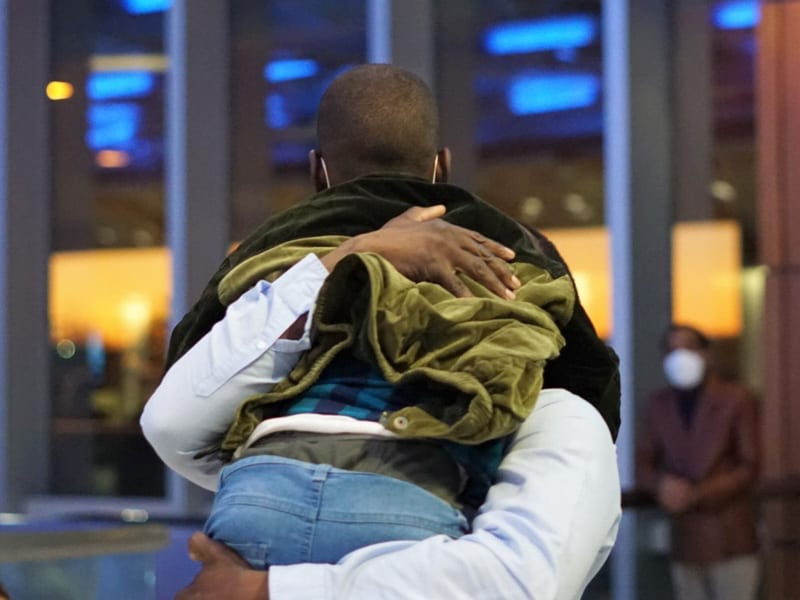
Now, with his family finally together again, Ibrahim has new hopes.
“My hopes are for my kids,” he said. “For them to get the right education, for them to be good people. I want them to make something for themselves and make me proud… for them to benefit themselves and our new country — the United States.”
Remembering Those Left Behind
Even as Ibrahim and his family continue building their new life together in the U.S., Darfur and the family, friends, and neighbors they had to leave behind are never far from his mind.
“People are really suffering there. They don’t have food, they don’t have water, they live in very unsafe, unhealthy conditions,” he said.
The UN estimates that 2.5 million people are living in displacement camps across Darfur, and 6.2 million people will need humanitarian assistance in the region within the next year. The same factors — war, violence, and persecution — that drove Ibrahim and his family from their home still impact people in Sudan today.
At World Relief, we recognize that addressing the drivers of mass displacement requires a multi-faceted and holistic response. In Sudan, World Relief is on the ground providing humanitarian assistance and investing in development and peacebuilding efforts to address the underlying factors contributing to conflict and displacement.
Building a just world means coming alongside families like Ibrahim’s once they’ve reached the U.S. and it means finding lasting solutions to the problems that force families to flee in the first place.
For Ibrahim, his hope for safety and brighter futures for those still in Darfur endures — “I really would like for them to… have a better life for themselves and for their kids.”
Together, we are taking action, hoping and praying for lasting solutions for displaced and separated families like Ibrahim’s both in the U.S. and in countries around the world.
World Relief Memphis, along with many other World Relief offices across the U.S., rely on partners and volunteers like you to help build welcoming communities. Join us on the path to hope, transformation, and lasting change alongside refugees and immigrants like Ibrahim.

Kelly Hill serves as a Content Writer at World Relief. She previously served as Volunteer Services Manager at World Relief Triad in North Carolina before moving to Salt Lake City. With a background in International and Intercultural Communication, she is passionate about the power of story to connect people of diverse experiences.
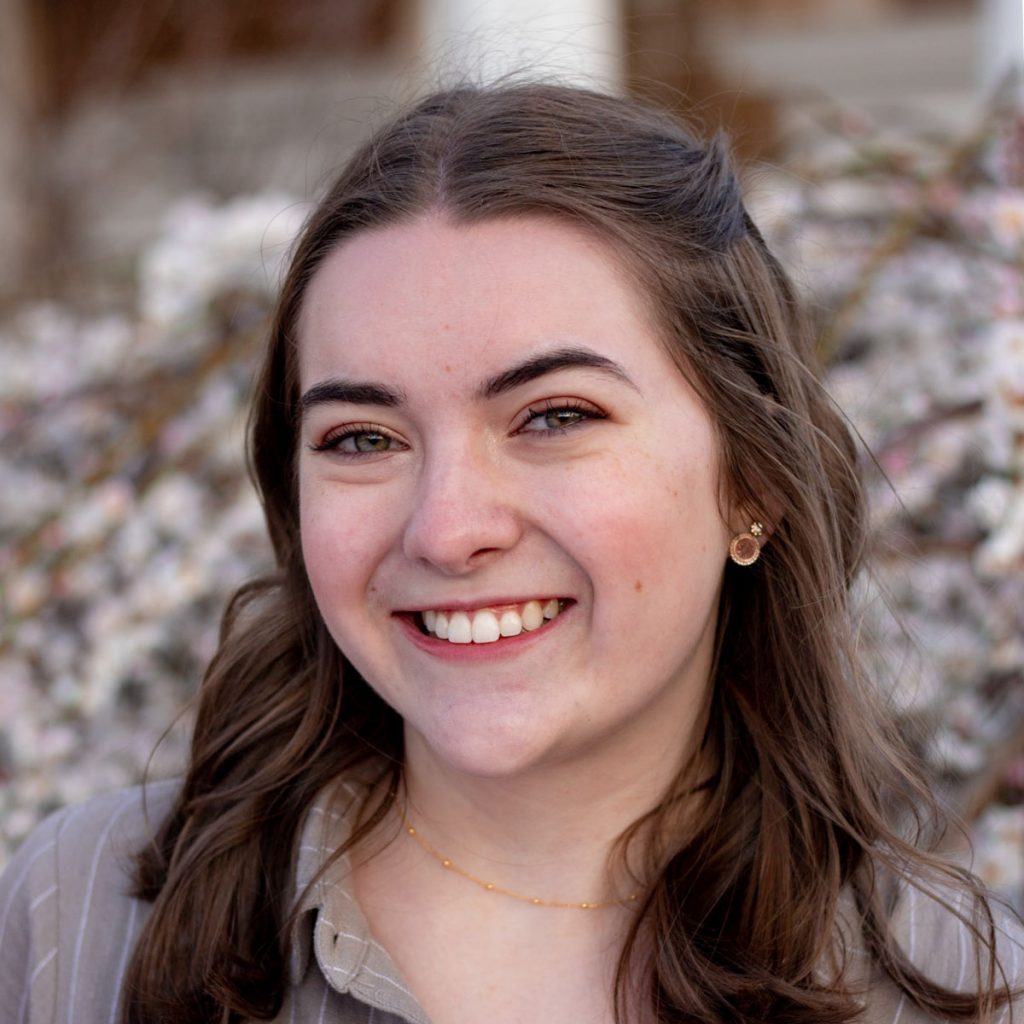
Abby Ray has been serving as the Communications & Advocacy Coordinator at World Relief’s Triad office since September 2021. She works to amplify the voices of clients, staff, and community members by empowering them to share their own stories.
20 Ways to Learn More About Refugees
Over the past year, crises in Afghanistan and Ukraine have reminded us of the devastating impacts of war — especially on those forced to flee their homes.
Around the world, a record breaking 100 million people have been forcibly displaced. Of those, 26.6 million are considered refugees, having fled across an international border due to war, violence, conflict or persecution. That’s millions of mothers and fathers, daughters and sons, teachers, doctors and friends — each created in the image of God — with full lives and identities long before they became refugees.
As we enter World Refugee Awareness Month and look toward World Refugee Day on June 20th, we’ve compiled a list of books, podcasts, videos and more to help answer your questions about refugees. As you engage with and share these resources, we hope you’ll be inspired to join us in creating a world where everyone can thrive.
READ
Blog: Drivers of Mass Displacement
For every 95 persons worldwide, 1 has been displaced. People are displaced from their homes for myriad reasons, including persecution, conflict, violence, human rights violations and climate-related factors. World Relief’s Lydia Dawson explains the drivers of mass displacement and how World Relief is responding globally.
Blog: Welcoming the Welcomers: One Afghan’s Journey to the U.S.
David was one of the 53,000 Afghans evacuated out of Kabul in August. He shares his story of escaping Afghanistan with his family, resettling with World Relief North Texas and the long road to rebuilding.
Book: Inalienable: How Marginalized Kingdom Voices Can Help Save the American Church
U.S. churches are at a critical crossroads — blurred lines between discipleship and partisanship have compromised our witness and confused our national and individual responses to refugees and “the stranger.” In a new book, pastor Eric Costanzo, missiologist Daniel Yang and World Relief’s Matthew Soerens find hope in the witness of global Christians, the poor and the ancient church.
Book: Beyond Welcome: Centering Immigrants in Our Christian Response to Immigration
World Relief’s Karen González, invites Christians passionate about serving immigrants to explore how we can create welcoming communities that put our immigrant neighbors at the center of the conversation. Now available for pre-order.
Book: Everything Sad is Untrue: (a true story)
Following his mother’s vocal embrace of Christianity, Daniel Nayeri, his mother and his sister were forced to flee Iran. In this memoir, he retells the tales of his family’s history from his perspective as a misfit middle schooler in Oklahoma.
Book: The Girl Who Smiled Beads
When Clementine was six years old, she and her 15-year-old sister, Clair, fled the massacre that was happening in their home country of Rwanda. In this riveting memoir, Clementine tells their story of rebuilding and reclaiming life on their own terms.
Book: On the Other Side of the Sky
After stepping on a landmine and narrowly escaping death, Farah Ahmedi fled her home country of Afghanistan with her family and resettled in the U.S. Today, Farah is a writer, mother, speaker, humanitarian and activist. She tells her story in this remarkable memoir.
LISTEN
This World Relief mini-series offers a global and a biblical perspective on the subjects of immigration, mass displacement and refugee resettlement, diving into current policies and practices and sharing stories of our collective human experience.
Podcast: Working a Refugee Crisis: Jordan
In 2011, civil war broke out in Syria resulting in the largest refugee crisis since World War II. In this six-episode series, hear conversations from refugees, locals, relief workers and aid agencies who responded to the crisis in Jordan and gain a deeper understanding of the refugee crisis.
This six-part series traces the U.S. refugee resettlement journey through the eyes of those directly experiencing it. Follow along as each episode brings the listener into the daily lives of refugees adjusting to life in the U.S.
Podcast Episode: Learn and Pray Together for Ukraine with Jenny Yang
Crises like the war in Ukraine can feel overwhelming. In this podcast episode, Jamie Ivey talks with World Relief’s Jenny Yang about practical ways Christians can respond through prayer, advocacy and action.
WATCH
TEDxTalk: One Refugee’s Life Experience | Come Nzibarega
Born and raised in Burundi, Come Nzibarega shares his story of escaping torture and civil war. Today, Come works as an Employment Specialist for World Relief. Hear more of his story and hear why Come thinks refugee camps are the richest places in the world.
After 8 years in a Refugee camp, Raphael arrived in the United States and was welcomed by World Relief volunteers. Now, he works on staff with World Relief in North Carolina. In this short video, he shares his resettlement journey.
Video: Who are Refugees and How Do They Arrive in the United States?
From flight and displacement to arrival and integration, this 7-minute animated video tells the true story of a refugee family’s experience in each stage of the refugee resettlement process.
STUDY
World Relief Workshop Course: Navigating Friendships
Navigating friendships with those who are different from us can be rewarding — and challenging! In this self-paced, online course you’ll learn essential skills for building empowering, long-lasting friendships with those who may differ from you in culture, socioeconomic status and religion, and best practices for supporting a friend who lives with trauma. Now through June 30, enroll for 50% off with code WORLDREFUGEEDAY50.
Our culture is flooded with thoughts and opinions on people who leave their homes and immigrate to the U.S. — but what does the Bible have to say about migration? Journey deeper into God’s redemptive story of migration and discover his heart for refugees, immigrants and the displaced in this free, six-week study from our partners at Women of Welcome.
Bible Reading Plan: The I Was a Stranger Challenge
Take the challenge and discover God’s heart for those who have been displaced. Over the course of 40 days, read one Bible passage a day that speaks to God’s love for foreigners and refugees.
FOR THE WHOLE FAMILY
Women of Welcome Family Toolkit
Do you wish you could talk with your kids or teenagers about immigration but aren’t sure how? This toolkit makes it simple and fun to invite your family to engage in positive conversations on hospitality and immigration through scripture reading, discussion questions, coloring pages, prayer journal pages, book recommendations and more.
For parents and teachers struggling to know how to talk about mass displacement with children and teens, the UN Refugee Agency offers teaching materials on refugees, asylum and migration, as well as guidance for teachers working with refugee children in the classroom.
Want to keep learning? Stay informed about refugee resettlement and World Relief’s work to care for those in vulnerable situations around the world by signing up for our monthly email newsletter.

Karen Spencer is World Relief’s U.S. Marketing Partner and serves U.S. offices in the area of identity and messaging. She previously served as Mobilization Director for World Relief in Memphis. She is a connector of people, places, passions and purpose.

Kelly Hill serves as a Content Writer at World Relief. She previously served as Volunteer Services Manager at World Relief Triad in North Carolina before moving to Salt Lake City. With a background in International and Intercultural Communication, she is passionate about the power of story to connect people of diverse experiences.











